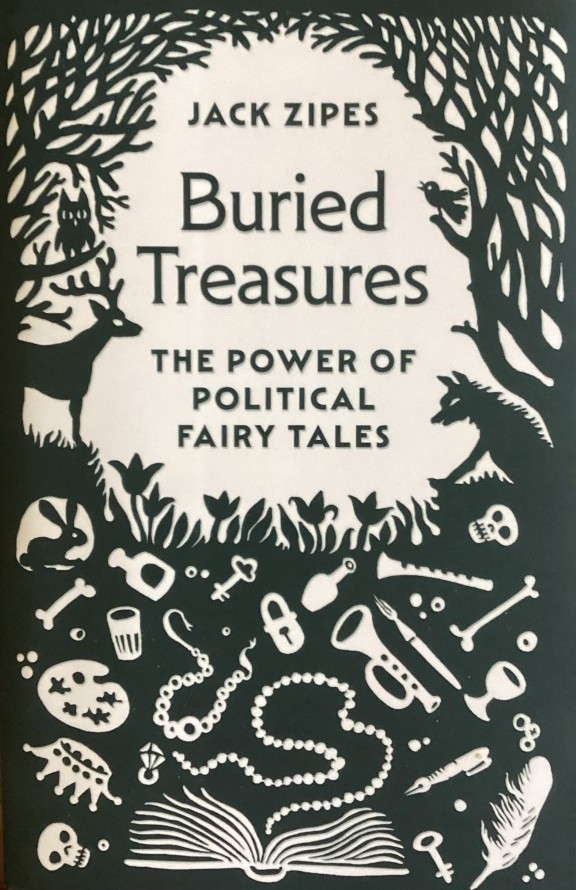Inspiring Older Readers
 posted on 27 Apr 2023
posted on 27 Apr 2023
Buried Treasures: The Power of Political Fairy Tales by Jack Zipes
Jack Zipes is a rare and precious commodity: an academic who is readable and accessible. His writings and his political views demonstrate that he’s not only got a formidable commitment to the power of literature, he’s also someone who believes in the importance of community. He is, to borrow a term from Jewish culture, a mensch – a term defined by Leo Rosten as "someone to admire and emulate, someone of noble character. The key to being 'a real mensch' is nothing less than character, rectitude, dignity, a sense of what is right, responsible, decorous."
It’s an open secret that we here at The Letterpress Project are big fans of his and you’ll find a review of his book, Tales of Wonder here and an exclusive interview with him here. So, when we got the chance to read a copy of his most recent publication, Buried Treasurers: The Power of Political Fairy Tales we said yes without a moment’s hesitation.
Why, you might wonder, is such a formidable academic mind spending so much time reading and writing about something as negligible as the humble fairy story? Well, the answer is simultaneously both simple and complex. Buried Treasures demonstrates from the very outset that Zipes is deeply committed to the idea that fairy tales matter – not just for children but for all of us:
“Fairy tales reveal what we lack and what we can become. Their endings are our beginnings. They are literally alternative worlds in which ethics and morals in our so-called real worlds are tested. To those people who think fairy tales are nothing but foolish and trivial stories for kids, there is no hope, for it is through our experience of imaginative worlds that we can create grounded strategies not only for survival but also for enlightenment.”
It follows, therefore, that fairy tales will have a political function too. They are a way of challenging the dominant and overbearing discourses that shape our social and cultural environments. Buried Treasures allows Zipes to bring together a series of essays he has written over the years about some of Western literature’s undeservedly neglected authors and illustrators of fairy tales from the 19th and 20th centuries.
You’ll find here a dozen essays that are both biographical pen portraits and critical appreciations of authors, few of whom I must admit, I’d ever heard of. I’m pretty sure my dreadful ignorance is widely shared but, having read them, their relative obscurity is puzzling. These are writers as activists, artists, code-breakers and revolutionaries - something the publisher’s own description captures well:
“These writers and artists used their remarkable talents to confront political oppression and economic exploitation by creating alternative, imaginative worlds that test the ethics and morals of the real world and expose hidden truths. Among the figures we meet here are Édouard Laboulaye, a jurist who wrote acute fairy tales about justice; Charles Godfrey Leland, a folklorist who found other worlds in tales of Native Americans, witches, and Roma; Kurt Schwitters, an artist who wrote satirical, antiauthoritarian stories; Mariette Lydis, a painter who depicted lost-and-found souls; Lisa Tetzner, who dramatized exploitation by elites; Felix Salten, who unveiled the real meaning of Bambi’s dangerous life in the forest; and Gianni Rodari, whose work showed just how political and insightful fantasy stories can be.”
I’m sure you’ll have your own favourite essay but mine is one of the longer ones that pulls back the curtain on the extraordinary life and work of the Hungarian, Béla Balázs – a man of cultural and political complexity and almost the perfect example of the seething central European melting-pot.
In his Epilogue to the book, Zipes reflects on the fact that these essays were written before both the Covid pandemic and Russia’s invasion of Ukraine. He has, he confesses, had to deal with issues that have fundamentally challenged his usual sense of optimism, his belief in humanity. But his root and branch belief in the power of literature and, especially, fairy tales has pulled him through – and the tale he tells us himself at the end confirms this.
I want to finish with another quotation from the Epilogue that I think captures the spirit and ultimate truth of this collection of essays:
“In collecting and publishing my recent essays, I want to demonstrate how and why highly talented writers and artists from the late nineteenth century up through the 1950 used their art to provide insights into the reasons for the outbreak of two world wars, and to expose the fraud of the dominant social classes. In their storytelling, writing, and illustrating, they sought to bring about peace and protect truth.”
The book is published by Princeton University Press and can be obtained from your local independent bookstore, who will order it for you if they don’t have it on the shelf. Alternatively, you can order it directly from the publisher on their website.
Terry Potter
April 2023